Proper nutrition for weight loss begins to interest us the moment we realize that diets do not help. Diets do not help - that's a fact. Why? The answer lies in those prohibitions and restrictions that abound in both modern and well-known, "proven over the years" diets. Proper nutrition for weight loss should be varied, healthy and nutritious, as strange as it may sound. There are several basic principles of such a diet. And also a bunch of misconceptions, misjudgments, stories about fantastic superfoods, blacklists of "harmful foods", as well as stories about their wonderful rehabilitation.

Before you start talking about nutrition, you should understand that in recent years, more precisely in the last 25-30 years, the balance of essential nutrients - proteins, fats and carbohydrates - is quite distorted to the carbohydrate component. At the same time, you don't have to strain and calculate too much - just go to each store and look at the pastries. They take up almost a quarter of the store space! And the first step to switching to a proper weight loss diet will be a complete rejection of sugar in your daily diet. Sounds scary, doesn't it? Do you know why? Because addiction to sugar is similar to drug addiction.
- Well, it started. . . - someone will say disappointedly, - Again, prohibitions and restrictions!
A few minutes of your attention and you will agree that giving up sugar can be a giant breakthrough in improving the health of the body and as a consequence weight loss.
We need carbs, of course. But which ones? We've all heard of fast and slow carbs. We need slow. Dishes made from cereals, wholemeal flour, vegetables. . . Fruits and berries are full of fast carbs, but it is better to eat fruits and berries than to buy pastries in the confectionery department. Many nutritionists suggest resolutely and abruptly abandoning carbohydrates of all kinds, reducing their consumption to 20-50 g per day. Such a sharp transition from the habitual to the useful can lead to dizziness, loss of energy, bad mood and the belief that it is not so useful and that it is proper nutrition.
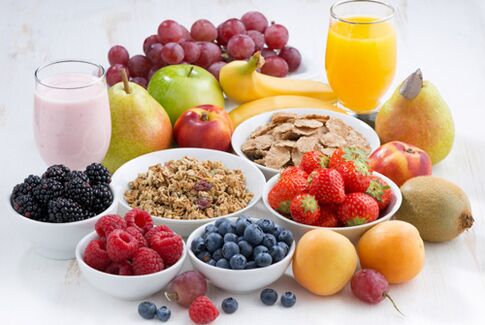
Proper nutrition for weight loss will bring much more benefit and joy if you switch to it gradually, consistently and do not be fooled. But first you need to understand why our body stubbornly opposes any changes, especially reducing the amount of sugar.
Sugar is truly the scourge of our time. Few products offered to us in supermarkets do not even have a teaspoon of sugar. We're not even talking about pastries right now! Juices, yogurts, marinades, sauces, semi-finished meat products, sausages and sausages, canned fish, instant soups, instant noodles. . . The list is almost endless! The worse the upcoming transition to new principles of nutrition - it turns out that there is almost nothing to eat !? Don't panic, there is a way out and he is quite calm.
Proper nutrition for weight loss begins with three steps.
First step:remove the sugar in its pure form. Tea, coffee, compotes without sugar. We refuse canned food, jams, pastries, chocolates, cookies and other joys from drinking tea with friends or during a work holiday. Ice cream, pastries, even low-calorie marshmallows are cut off from our table! All carbonated drinks are prohibited. Try to stay without sugar for two weeks, only two weeks - you will be surprised. It turns out that tea has a different taste. Coffee too. Cocoa with milk, but without sugar, loads better than any stimulant. And what should be served with tea? At this stage nuts (not salted), dried fruits, energy mixtures with honey (a mixture of nuts and dried fruits passed through a meat grinder, you can add lemon), sandwiches with butter (yes, yes! ), Cheese and normal sausage and more- better with home-cooked pork, with caviar, lightly salted salmon, etc. At the same time, tea with all these extras should be included in breakfast, lunch or dinner, and not be a regular breakfast. For breakfast, however, a little later.
Step two:When the body switches from fast to slow carbohydrates, it's time to eliminate foods with a high glycemic index: premium wheat flour, white rice and potatoes. That is, all rolls, cakes, pies, mashed rice porridge, semolina porridge, as well as everyone's favorite semolina pies and potatoes in any form automatically turn from everyday food into a delicacy. Yes, and soups will now also be without potatoes. At the same time, rye bread and bakery products made from wholemeal flour (no sugar, remember? ), Buckwheat steamed or simply drizzled with clean water overnight, instant oatmeal, they are very well mixed with fermented dairyproducts, as well as all exotic or forgotten cereals such as spelled, quinoa. In addition, you should frankly eliminate sweet fruits from the diet - bananas, grapes, pears. Fruits are not included in this list due to their high acid content.
Step three:at this stage you should give up all carbohydrates, leaving only natural carbohydrates that are part of vegetables and pickles. Sometimes, however, the first two steps are enough to significantly lose weight. And if you fulfill a few more conditions in parallel, then you will not have to look for a new diet for yourself - you will move to a whole new level, where proper nutrition comes first, and for life.
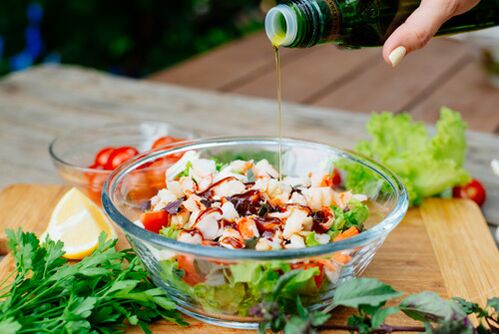
Proper nutrition for weight loss should be varied.This means that the balance should include not only the famous BJU (proteins, fats and carbohydrates), but also vitamins and trace elements. And if carbohydrates bring us energy in a clean, affordable form, then it is much harder for the body to get that energy from protein and even more from fat. But, as often happens, what is difficult to obtain is usually the most useful. Calories from carbohydrates are usually excessive, our body spends almost no effort to process them, which is why "sugar calories" fit so quickly into cozy fat rolls.
Protein is vital for our body.Protein is important throughout life: in childhood it is a building material, and in adulthood it is an element that helps our body to function and maintain itself in its best form for as long as possible. Judge for yourself: protein performs a protective function, helps in the production of antibodies, transport, the most famous protein hemoglobin delivers oxygen to each cell, regulatory - normal hormone production is impossible without protein, motor - all types of movements are provided by proteins myosin and actin, plastic - collagen protein is responsible for the condition of connective tissue, the appearance of the skin and more. , energy - proteins supply the body with energy. But perhaps one of the most important tasks of the protein is the preservation and transmission of genetic information. It is believed that the increasingly common terrible disease "Alzheimer's disease" is directly related to insufficient protein intake (not only with it, but also the second most important component a little lower).
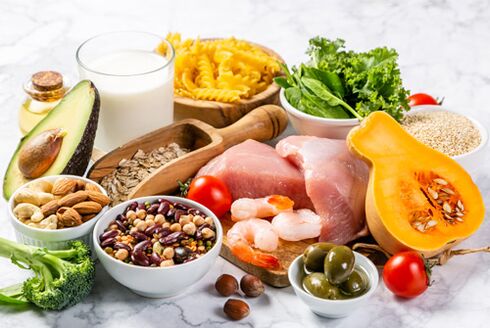
How much protein does the average adult need? Many nutritionists, doctors and supporters of proper nutrition adhere to the norms of protein intake set more than a hundred years ago by the German scientist Max Rubner and this norm was 0. 33 g of protein per 1 kg of human weight. Much has changed since then, science has moved forward and recent studies have found a strong average of 1, 2 - 2, 0 g per 1 kg of body weight. Impressive difference. In addition, these 1, 2 - 2, 0 g is not the weight of the product, say, a piece of meat or a serving of beans, and the content of pure protein in the product. An example table of high protein foods is available on our website. Our site has written about the benefits of protein products more than once, but it never prevents us from repeating these common truths.
Despite the great popularity of vegan, raw foods and vegetarian diets, we still need at least 50% animal protein to keep the body healthy and unable to survive. These are eggs, dairy products, fish and seafood, meat and offal. It is these proteins that have a complete set of amino acids, unlike plant foods. Although they should be eaten, if only because variety is the essence of proper nutrition!
It is clear that there are few products on our planet that consist of the same substance. Almost every food is a combination of protein, carbohydrates and fats. And here with the last ingredient - fat - happened, perhaps, the greatest criminal story in the history of nutrition science. At one point, the "perfect" fat was declared the enemy of health. Everyone has heard terrible stories about cholesterol, blood vessel plaques and other horrors. And watching stores fill their range with low-fat or completely low-fat products at an enviable rate, you doubt the sincere desire to feed us with "correct", "healthy", "live" food, because there is nothing right and useful in the absence of fat in the diet.
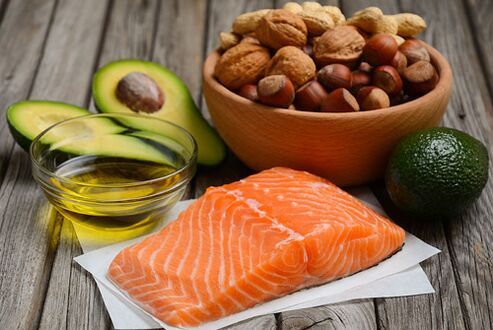
So what is the function of fat in our body? You will say - help in the absorption of fat-soluble vitamins. Is that all? From biology lessons from school days, someone will remember the function of heat transfer to fat. Thus, the most important function of fats in the body is the surfactant metabolism, ie in simple words, ensuring the exchange of oxygen in the alveoli of the lungs. The fat arranges the walls of the alveoli in the thinnest layer and allows us to breathe and. . . to live. My grandmother's methods of treating lung diseases immediately come to mind: badger fat, dog fat, goose fat, hot milk and butter - there is fat everywhere, inside and out, and that helped! And by the way, it still helps, just drugs to treat hypoxia (oxygen starvation), which are now sold for wild money, are actually a fat emulsion. Another important function of fats is the synthesis of membranes. The cell membrane consists of 70-85% fat, and the function of the membrane is to provide protection to the cells, their thermal insulation and selective permeability (because not everything that seeks to enter the cell is useful and necessary for it). The myelin layer, this insulating sheath of our nerves, is 70-80% saturated fat. Myelin-free - suffer from Alzheimer's disease, senile (much younger) sclerosis and dementia. Fat is one of the most important substances vital for the building of membranes, the myelin sheath, ensuring their work, as well as the functioning of the central and peripheral nervous system. Remember this when choosing between 0, 5 and 3, 2% fat milk.
Another important function of fats is hormonal. Fats are sources of hormone synthesis and there are many in our body. These are growth hormones, protein hormones, thyroid hormones, digestive hormones, steroid hormones, adrenal hormones, sex hormones and more. It is clear that even the slightest bias, insufficient production of any hormone threatens huge disturbances in the work of the whole organism. A sudden attack of blackheads and acne, any skin rash are a sign of low androgen levels. Frequent "no cause" headaches can be a sign of low estrogen levels. Persistent insomnia - insufficient progesterone. Fatigue, exhaustion and even exhaustion even during rest can be a sign of impaired production of thyroid hormones. Hair loss is also a sign of this disorder. Weight gain may be due to high levels of the hormones estrogen, cortisol and insulin, combined with low levels of testosterone. Forgetting and distraction are indicators of low levels of estrogen and cortisol. How everything is connected!
Fats are responsible for regulating heat. This is why men who are not on a diet are often hotter than women who are always losing weight. Constant freezing of the hands and feet is most likely a sign of fat deficiency, if this is not a congenital feature. The most famous function of fats is to dissolve and help absorb fat-soluble vitamins: A, E, D, K. Sitting on a low-fat diet and drinking vitamin complexes - not an option, vitamins simply will not be absorbed.
And last but not least - vitamins, minerals, macro-and micronutrients. These substances are found in different amounts and combinations in all products, but special attention should be paid to fresh vegetables, roots, fruits and berries. One of the most valuable vitamins - vitamin C - is not synthesized in our body and we can get it only from fresh plant products. Our site has filled an entire section on vitamins, read it, it is useful! Plant foods contain enzymes and flavonoids, all kinds of minerals, without which we simply cannot function normally. For example, potassium - the work of the heart without it will be disrupted. Magnesium is responsible for the health of the brain, nervous and hormonal systems and is involved in metabolic processes. And also in plant products there is fiber - without them the processes of digestion and peristalsis are almost impossible!
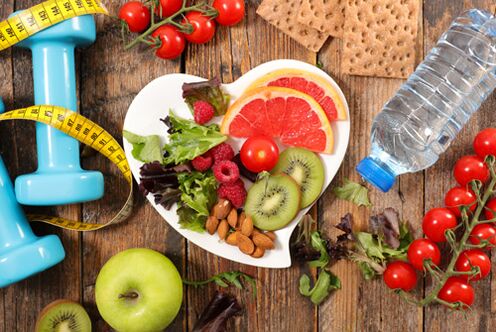
Proper nutrition to lose weight and improve the body includes the following principles:
Eat no more than three times a day. Unexpected, isn't it? But what about 5-6 meals a day, advertised in many recommendations? Such partial meals are ideal for children, athletes and seriously ill citizens. If you are not in any of these categories, eat three or even twice a day.
Eat only when you feel hungry, not at night. Breakfast is optional! If you don't feel like eating in the morning, readjust your breakfast a few hours later. Don't cram food into yourself just because someone said breakfast is the most important thing.
Learn to listen to yourself and understand the difference between hunger and the usual habit of mixing something between them. The following recommendation will help with this.
I drink water. Not in liters, as sometimes recommended. Not cooked. Ideally bottled or spring. The drinking regime is easy to disgrace: 2 glasses of lukewarm (not cold and not boiling water) in the morning, 1-2 glasses during the day and 1 in the evening. Sometimes it is enough to drink water to understand that it is just thirst, not hunger.
Get in the habit of buying all kinds of nuts and seeds more often. In addition to fats, they contain a huge amount of macro and micronutrients.
Eat whole foods. That is, it is not fat-free! Cottage cheese - 9% fat, not less, but with sour cream, coffee with cream, butter sandwiches, fatty cheeses, fatty sea fish, exotic avocado, bacon! This is not a typical "fire-to-fire" distortion. A measure is needed in everything, of course.
Don't forget about proteins! But no less important is what to combine it with. And this recommendation will be the last.
Eat vegetables. Lots of vegetables and herbs. Fresh, marinated, marinated, steamed, boiled and even fried in oil! But fresh salads, of course, are preferable. It is not difficult to calculate the amount of vegetables: mentally divide your plate into two parts - half will be occupied by vegetables, and the second will hold protein, fat and the same allowed minimum carbohydrates.
Proper nutrition for weight loss is not strict tables and recipes. This is a deliberate approach. All of these tips will only work if there is almost complete rejection of carbohydrates. If you combine protein with carbohydrates (mashed potatoes with cutlet) or fat with carbohydrates (bacon with bread) in one plate, you are ready. More precisely, no, of course, you will not die immediately. You will just go on living, sighing death over every new pound and complaining about the injustice ("I'm literally sitting on the same water, where does the fat come from??? "). hunger, diet products. Just start with three steps and go, without turning anywhere, to health and beauty.













































































